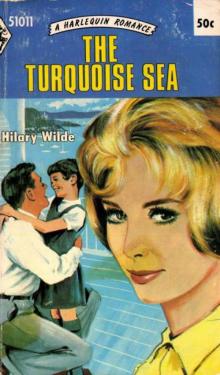- Home
- Hilary Wilde
The Impossible Dream
The Impossible Dream Read online
THE IMPOSSIBLE DREAM
THE IMPOSSIBLE DREAM
Hilary Wilde
British Library Cataloguing in Publication Data available
This eBook edition published by AudioGo Ltd, Bath, 2012.
Published by arrangement with the Author’s Estate .
Epub ISBN 9781471300325
U.K. Hardcover ISBN 978 1 408 45736 8
U.K. Softcover ISBN 978 1 408 45737 5
Copyright © Hilary Wilde 1972
All the characters in this book have no existence outside the imagination of the Author, and have no relation whatsoever to anyone bearing the same name or names. They are not even distantly inspired by any individual known or unknown to the Author, and all the incidents are pure invention.
All rights reserved.
Jacket Illustration © iStockphoto.com
CHAPTER I
As the schooner slowly approached the opening in the coral reef, Megan Crane could see the jetty, crowded with people. The water was the wonderful deep blue of the Indian Ocean, the sky cloudless, even the wind was warm against her cheeks. The town looked small, with the little houses huddled together as if seeking the sanctuary offered by the tall mountains towering above them.
‘Well,’ Miss Wilmot by her side said, ‘here we are. I wonder if Mr Lambert himself will come and meet us. I doubt it, as we’re not the V.I.P.s he honours.’
Megan Crane turned to look at the tall, slim woman with her elaborately-dressed hair. ‘You don’t like Craig Lambert?’ Megan asked.
The words were impulsive and after she had said them Megan regretted it. Her hands tightened round the rail of the ship. Nor did she like Craig Lambert, she thought angrily, for he was ruining her brother Patrick— deliberately, too.
Then why was she here, she asked herself, on the way out to this island near the Seychelles, to work for Mr Lambert?
She smiled wryly. What choice had she? She looked at the white-flecked waves. She’d had no choice. Her father had thrown her out, so she had needed the job badly. In addition, though she and Patrick had shared little love with one another, at least he was her brother, and if she could find a way to help him . . .
Miss Wilmot, Mr Lambert’s P.A. who looked after his affairs in England when he was away, smiled. ‘What a question,’ she said. ‘I work for him. Surely that’s answer enough?’
‘I wonder,’ Megan replied.
The schooner was rolling gently as it waited outside the reef opening. The lagoon they could see was not large and a schooner was anchored by the jetty already.
Suddenly Megan’s fears had to be put into words. ‘Miss Wilmot,’ she asked, her hair, honey-coloured and long, swinging as she turned her head, ‘how will I get on? What is Mr Lambert like to work for? As I’ve told you, I had no real training as a dancer, even less as a dance teacher.’ She tried to laugh. ‘I’m really worried. Why did I get the job?’
Clara Wilmot looked at the anxious girl by her side and gave an odd smile. ‘Your Mrs Arbuthnot gave you a good reference. She’s known you for years, I gather. Also . . .’ her mouth twisted into an even more cynical smile, ‘you appear to have made a good impression on Mr Lambert.’
‘Did I?’ Megan found herself laughing. ‘If you’d known how I felt at that time! My whole life had been turned upside down. I’d been looking after my father for four years, thinking he needed me and what a good daughter I was being, then—quite suddenly—he told me I was a burden, that if I could find a job and a bedsitter, it would solve his problem. I didn’t know what to do for . . . well, I wasn’t trained for anything, going straight from school to look after Dad . . .’ She paused, watching the small launch that was skimming over the lagoon, leaving a wake of white beauty behind it. ‘Then Mrs Arbuthnot said a gentleman had been making enquiries for a dancing mistress for an exclusive school and she thought I would be suitable. I couldn’t believe it. Anyhow, he came one day. Luckily I didn’t know he was there, because he watched me give several lessons.’ Megan laughed again. ‘If I’d known he was there, I’d have made an awful mess of it, for I’d have been petrified. Then I met him and he asked me the strangest questions. They seemed to have nothing to do with the job.’
‘Mr Lambert is like that,’ Clara Wilmot said slowly. ‘He’s more interested in his employees’ characters than their credentials. After all, he has to be careful because this is an exclusive school. We often get children from abdicated or thrown-out European royal families as well as the very rich. We have to protect the children from unwanted publicity . . . or I should say we have, but it’s not been so easy since Gaston Duval took over.’
‘Gaston Duval?’ Megan repeated slowly. She had read Patrick’s desperate letter to his father, asking for financial help, mentioning a friend who was away or there would have been no need for this appeal. Could Gaston be the friend? Megan wondered.
The launch was coming fast towards them, she saw. Would Mr Lambert be in it? she wondered. No, she decided, it could be the pilot. Perhaps the opening in the coral reef was tricky.
‘Gaston Duval and Craig Lambert are enemies,’ Clara Wilmot was saying slowly. ‘Like their fathers were, and their grandfathers. It’s a family feud. Gaston wants the island to become a world-famous holiday-place.’
‘Yes,’ Megan agreed. ‘I remember when Patrick and Georgina came out . . .’
‘Patrick Crane . . .’ Miss Wilmot said slowly, her voice rising, her face changing as she turned to look at the girl by her side. ‘Is he a relation of yours?’
‘My brother.’ A faintly defiant note crept into Megan’s voice. Though she didn’t love Patrick, she was allowing no one to run him down!
‘Why on earth didn’t I . . . The name—I should have thought . . .’ Miss Wilmot sounded agitated, unusual, for normally she was not only efficient but impersonal. Now she began to look angry. ‘Did you tell Mr Lambert?’ she asked.
‘Of course.’ Megan was puzzled. ‘As soon as I knew where the Lambert School was, I told Mr Lambert my brother lived on the island.’
‘And what, if I may ask, was his reaction?’
Megan frowned. She had a fey look in many ways, with the cloud of hair that kept falling over her face, the unhappy eyes, the wistful smile.
‘Well, in a way, he wasn’t very pleased.’
‘I’m not surprised,’ Miss Wilmot almost snapped.
Megan’s hands clenched. ‘And why not?’ she demanded.
‘Your brother and his wife are part of the island’s lesser-liked population. They’re friends of Gaston Duval. That alone is damning.’
Megan nodded silently—so Gaston Duval was Patrick’s friend.
‘What did Mr Lambert say when you told him?’ Clara Wilmot asked, her voice crisp.
‘Nothing, really. It was the way his eyes narrowed as he stared at me. He asked me if that was why I had applied for the post, but when I said I hadn’t even known where the school was and that Mrs Arbuthnot had arranged everything, Mr Lambert seemed to relax.’
‘He believed you?’ Clara Wilmot gave a strange laugh and Megan blushed.
‘Well, it was the truth.’
‘Maybe, but he doesn’t usually. Still, maybe he has a reason. Craig Lambert does nothing without a reason. By the way, in case you meet Gaston Duval, watch out. He’s said to be most charming, but knowing him could cost you your job. Gaston is said to be very handsome and Craig Lambert . . .’
‘Is the ugliest man I know,’ Megan said angrily. What right had Craig Lambert to lay down laws about who she could know? It was true, as well, that Craig was ugly—a strange ugliness that attracted you against your will. Would she ever forget the first time she met him, introduced by Mrs Arbuthnot? A tall man with incredibly broad shoulders, a sun-tanned skin, sq
uare chin, high forehead, dark haircut too short by modern standards, and a grave, unsmiling face. He had stared at her thoughtfully, narrowing his eyes in that sceptical way, and she had seen the mole on his cheek. His voice had impressed her: a deep vibrant voice, full of life and strength. And impatience.
‘Is that so? I had no idea,’ a deep, vibrant but amused voice asked. It was Craig Lambert himself.
Megan swung round. She had forgotten about the launch, but as she looked about her wildly, seeking the right words to say, which in any case would be quite inadequate, for she had been unforgivably rude, she saw there was no sign of the launch. So Craig Lambert had come to meet her.
‘I . . . I . . .’ she began nervously, looking up at the grave-faced man staring at her. He was wearing a thin white suit.
Miss Wilmot, always tactful, came to her rescue.
‘I didn’t expect you to meet us, Mr Lambert,’ she said. ‘It’s nice of you.’
‘You won’t think so in a minute,’ he said dourly. ‘Someone had to meet Miss Crane, because you’re going back immediately. The schooner is waiting, so . . .’
‘But I thought . . .’ the elegantly-dressed, so composed Miss Wilmot, in her pale pink shantung suit, looked as if she was going to cry, Megan thought.
‘So did I. Sorry,’ Craig Lambert said quickly, but not as if he really meant it. ‘Things have changed. That merger with Cox is important and something has come up, so I need you on the spot. You know as much about it as I do, perhaps more. You can come out another time.’ He moved his hand impatiently, as if brushing away her disappointment. ‘We’re going ashore in the launch as I have to get Miss Wilmot on the schooner that’s waiting for her,’ he said with equal curtness to the silent Megan, whose red cheeks had returned to their usual colour, but who still felt horrified at what she had said and he had heard. It was hardly, she was thinking, a good start to a job she was afraid she didn’t qualify for.
He led the way to the waiting launch. Only Miss Wilmot’s luggage was to be taken.
‘Miss Crane’s will come later,’ Craig said curtly.
The launch bounced about in the rough waves which came roaring to break up on the coral reef, but once through the narrow opening, the water was as smooth as any village pond. Craig Lambert was talking briskly to Miss Wilmot, who looked slightly green but was dutifully making notes of what he told her. No one looked at Megan, so she sat very still, grateful because she wanted the chance to look at the land that was going to be her new home . . . for as long as she could keep the job!
As they came closer to the island, she could see how beautiful it was. So much colour. Trees with huge red flowers, arches covered with purple blossoms, the dark-skinned men crowded on the jetty wore white trousers and sleeveless shirts as well as straw hats, but the women, crowding with them, seemed all to be wearing bright crimson or vivid yellow dresses.
Palm trees were standing along the quayside, their slender trunks bent as if the wind had pushed them down for so many years that they had given up the fight. To Megan, palm trees meant so much. They were part of her impossible dream.
‘The impossible dream,’ she said silently, staring at the island before her. The dream she had so often had in her life. Oddly enough, usually after an un-happy day, and—looking back—she realised just what a lot of unhappy days she had had in her twenty years of life. Always there had been this impossible dream—that one day she would live on an island where palm trees were silhouetted against the mountains, where the ocean came racing in, tossing fountains of sun-kissed water in the air as it hit the coral reefs, then coves of white soft sand that caressed your skin while the sun browned it, the exciting deep blue sea where strange fish lived, and trees full of chattering monkeys and tiny, brightly coloured birds hovering over flowers . . .
She had seen the island so often, getting brochures from travel agents and keeping the chosen picture hidden from Patrick’s curious eyes. Sometimes she had decided on Barbados, or Jamaica, or the Canaries, but never, somehow, had she thought of the Seychelles. Yet here she was.
It had been Mrs Arbuthnot who reminded her on that terrible day, when the rain poured down and a gale blew along Hastings’ front, and her father had just told her Patrick, her brother, was in trouble. Patrick always was in trouble, she had thought rebelliously. Patrick could do no wrong. But this, it seemed, was serious. He needed the money urgently.
How worried her father had looked! ‘If only you had a good job, Meg, and could live on your own, in a bed-sitter, perhaps, then I could sell this house,’ her father had said.
She had felt frozen with shock. ‘But what about you?’
He had nodded. Apparently it had all been arranged and nothing said to her, yet her father must have known this would happen, for he went on: ‘Your Aunt Lily wants me to live with her. She’s bought this cottage in Dorset, but says it’s very isolated and she would like a man around.’
‘But you and Aunt Lily . . .’ Megan had begun, pausing again as her father looked at her. He was doing this for Patrick, she knew. Patrick who could do no wrong. Yet Dad had never got on with deaf Aunt Lily who rarely stopped grumbling.
‘Perhaps Mrs Arbuthnot could help you find a job, Meg?’ her father had suggested. ‘One with a better salary, full time.’
Now, as the launch approached the jetty, Megan could remember the frozen desolation she had felt that day as she hurried to Mrs Arbuthnot’s College of Dancing, running through the rain, stumbling through puddles, bent as she went along the Front, battling with the high winds racing across the Channel. Mrs Arbuthnot had been sympathetic. It was then she had told Megan about the gentleman who had been to see her, having heard high praise of her dancing college.
‘You might just do, Megan,’ Mrs Arbuthnot had said excitedly. ‘One door closes and another opens. Perhaps this is your impossible dream? I just can’t understand your father— after all you’ve done for him, given up your dancing, your schooling, just to look after him and yet he can treat you like this.’
‘He’s never loved me,’ Megan had told her. ‘Aunt Lily said it was because I killed my mother.’
How angry Mrs Arbuthnot had been! Her cheeks bright red, her eyes flashing. ‘Your Aunt Lily! Look, your mother was told to have no more children after Patrick was born. She should never have had you. But you didn’t ask to be born. I blame them. They should have been more careful.’
‘Are you all right, Miss Crane?’ Craig Lambert’s harsh voice penetrated Megan’s dreams. ‘You’re very quiet.’
She jerked back to the present, to the launch that had drawn up by the jetty, with Miss Wilmot being helped out and Mr Lambert scowling.
‘I’m sorry, Mr Lambert. I was thinking . . .’
‘I’m not surprised,’ he said. ‘You must have a lot to think about. Come along, I haven’t all day,’ he added.
He helped her climb the ladder, and then she was surrounded by the chattering, laughing Creoles who had crowded the jetty, many laden with hand-made goods they hoped to sell. Mr Lambert spoke to them curtly, in a strange kind of French that Megan found hard to translate, then he turned to her.
‘Wait here while I get Miss Wilmot settled.’
The tall, elegantly-dressed woman shook hands with Megan formally, but Miss Wilmot had a shocked look as if her surprise and disappointment was still upsetting her.
‘Goodbye.’ Miss Wilmot looked round and saw that Craig Lambert was striding down the jetty, the people moving out of his way, much as waves seem to do as a launch prances through them. ‘Good luck,’ Clara Wilmot said quietly. ‘You’ll need it.’
Feeling dismayed, Megan stood very still, staring at Miss Wilmot’s straight back as she hurried away.
Why was she going to need good luck? And why had Mr Lambert given her the job if he disliked Patrick? Was he going to use her as a weapon against Patrick? That was another question, but it was absurd. How could he hurt Patrick through the sister Patrick had never loved? Yet perhaps—indeed, of course, Mr Lambert coul
dn’t know that.
What sort of man was she going to work for, anyhow? Curt, dominant, impatient, arrogant and, apparently, ruthless, according to Patrick.
She could no longer see Miss Wilmot, who had not turned for a final wave, so Megan looked at the island. The islanders, obviously respecting whatever it was Mr Lambert had said to them, kept away from her, talking to one another excitedly, with laughter filling the air.
How lovely it could be living here, Megan thought, relaxing as she leant against the railing of the jetty. It was hot, but not too humid, and the slight breeze caressed her cheeks with a pleasant warmth. She looked at the small town. How crowded and small were the stone-made houses. They all seemed huddled round a centre square where there was a large white cross. Then the road seemed to vanish in a mass of trees and start to climb the mountains that sheltered the valley. On the mountainside she could see tiny houses clinging to the soil, some cattle grazing and several waterfalls so far away that the water looked like a silver pencil line down the green grass.
‘Well?’ The deep vibrant voice made her jump as Craig Lambert joined her. ‘What do you think of it?’
Megan’s hair swung as she turned her head. Her cheeks were flushed from the heat, her eyes shining with excitement.
‘It’s very beautiful.’
‘Good. Not that you’ll come here often. Of course, you’ll want to visit your brother. That can be arranged. Are you very close to one another?’ he asked curtly, starting to walk away.
She had almost to run to keep up with him, for his strides were long, quick and apparently effortless. She had always prided herself on being a good fast walker, but this was no . . . nor could she hear all he was saying as he spoke over his shoulder.
‘Not . . . very,’ she managed to say.
‘I see. Not a close brother-sister relationship. Just as well, perhaps. We prefer to keep the girls out of certain parts of the island. Lately so much has deteriorated. Unfortunately there has been little I could do about it, but now,’ his voice sounded triumphant, ‘things are going to change.’

 Uncertain Joy
Uncertain Joy The Blue Mountains of Kabuta
The Blue Mountains of Kabuta The Isle of Song
The Isle of Song Red as a Rose
Red as a Rose The Master of Barracuda Isle
The Master of Barracuda Isle A handful of dreams
A handful of dreams The Turquoise Sea
The Turquoise Sea The Fire of Life
The Fire of Life The golden valley
The golden valley The Impossible Dream
The Impossible Dream Paradise Island
Paradise Island